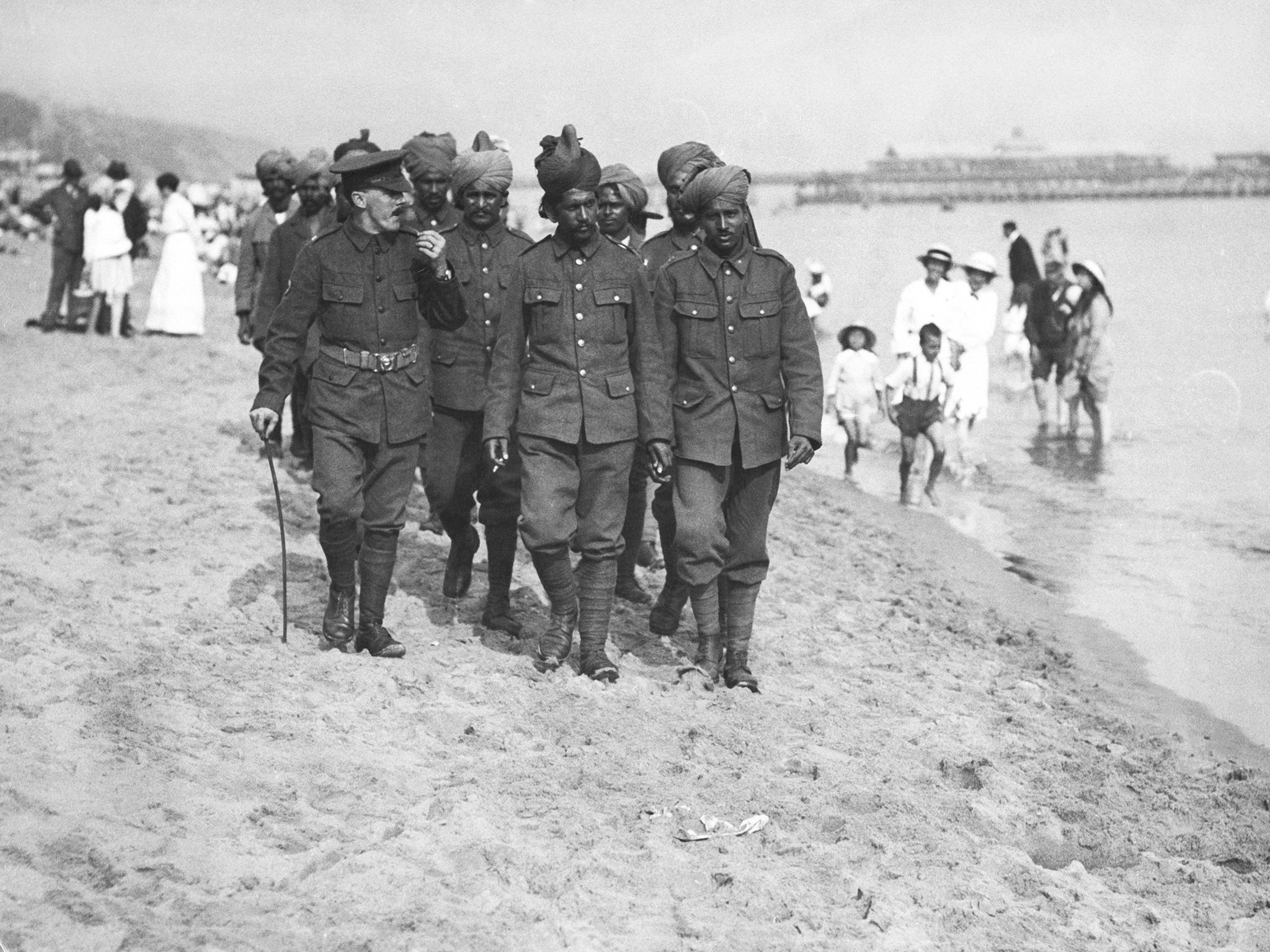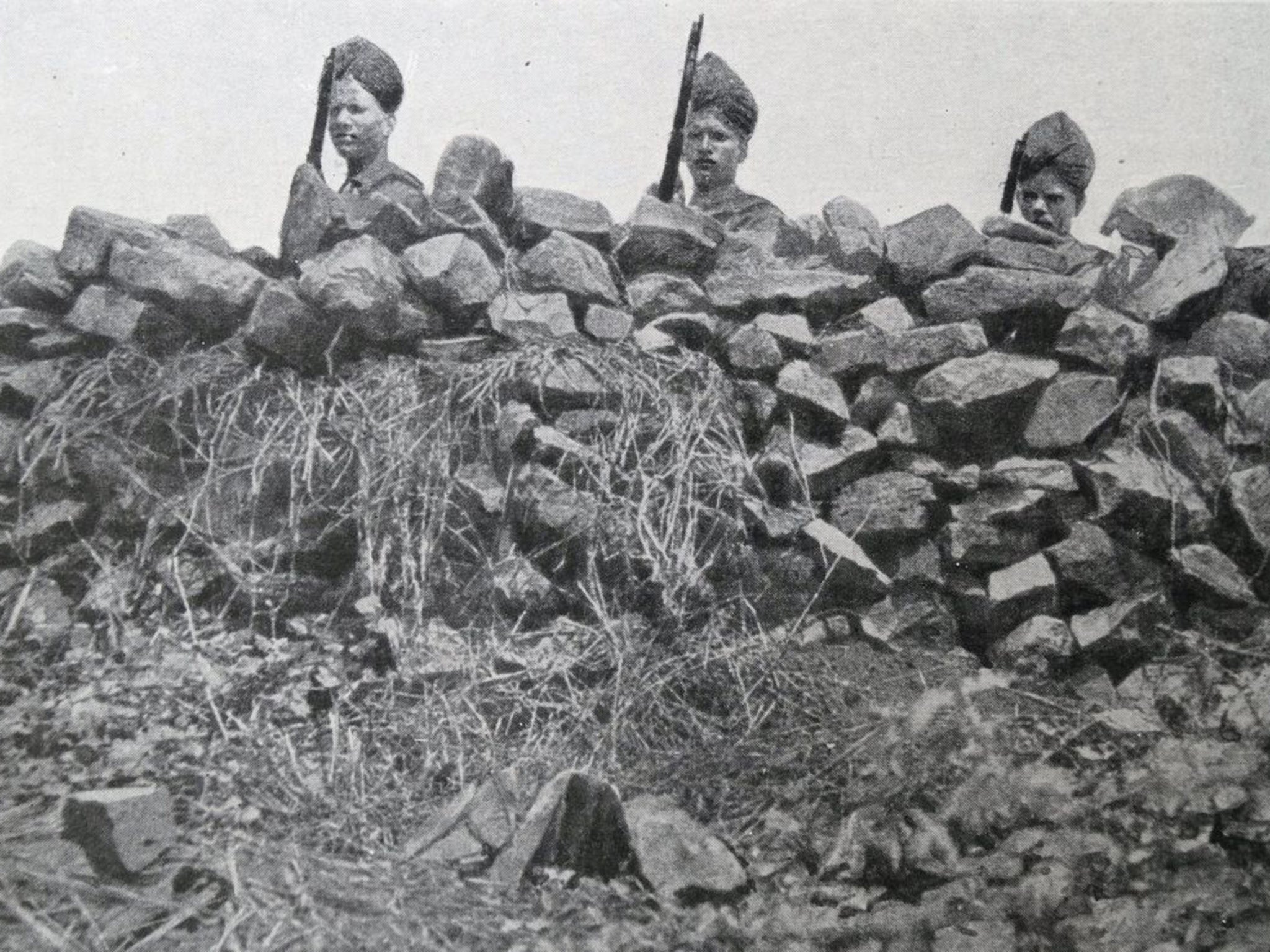Forgotten role of Indian soldiers who served in First World War marked at last
'Few people are aware 1.5 million Indians fought – that there were men in turbans in the same trenches as the Tommies'

Your support helps us to tell the story
From reproductive rights to climate change to Big Tech, The Independent is on the ground when the story is developing. Whether it's investigating the financials of Elon Musk's pro-Trump PAC or producing our latest documentary, 'The A Word', which shines a light on the American women fighting for reproductive rights, we know how important it is to parse out the facts from the messaging.
At such a critical moment in US history, we need reporters on the ground. Your donation allows us to keep sending journalists to speak to both sides of the story.
The Independent is trusted by Americans across the entire political spectrum. And unlike many other quality news outlets, we choose not to lock Americans out of our reporting and analysis with paywalls. We believe quality journalism should be available to everyone, paid for by those who can afford it.
Your support makes all the difference.Like 1.5 million of his fellow countrymen in colonial India, Sukha volunteered enthusiastically when the call came for recruits to bear arms for Britain’s “King Emperor” in a far-off European war in 1914.
It was a journey from which the 30-year-old serviceman, again like tens of thousands of his compatriots, never returned. But when Sukha died, his remains were abandoned in a different “no man’s land” from the Flanders quagmire that claimed the lives of so many who fought on the Western Front in the First World War.
Sukha was a so-called “untouchable” – those regarded with such disdain that they did not merit a surname and performed menial functions, from cooking to emptying officers’ bed pans. When he died of pneumonia in 1915 in a Hampshire military hospital, neither his Hindu nor Muslim comrades were prepared to accept his body for burial. Instead, the vicar of St Nicholas Church in Brockenhurst offered a space in the graveyard for him.
The headstone, bought with contributions from parishioners, paid tribute to the serviceman from Uttar Pradesh. It reads: “By creed, he was not Christian, but his earthly life was sacrificed in the interests of others.”
The story of Sukha casts an uncomfortable light on the prejudices of India’s caste system, which persist to this day. But it is also a tale that highlights another troubling legacy of the First World War – the forgotten role of the vast numbers of men who travelled from the British Raj to fight in the trenches of France and Belgium.

A new book, For King and Another Country: Indian Soldiers on the Western Front 1914-18 by Shrabani Basu, recounts for the first time some of the personal stories of the Hindus, Sikhs and Muslims from modern-day India and Pakistan who fought alongside the British and other allies in the conflict. For 12 months between 1914 and 1915, the British Indian Army fought on one of the bloodiest stretches of the Western Front.
But despite contributing the largest volunteer army from Britain’s imperial dominions at a cost of some 70,000 lives, there is concern that the sacrifice of the fighters from pre-partition India has been allowed to slip between the cracks of the post-colonial history of both countries.
Basu, a historian, told The Independent on Sunday: “Few people are aware that 1.5 million Indians fought alongside the British – that there were men in turbans in the same trenches as the Tommies … They have been largely forgotten, both by Britain and India.
“The soldiers who had fought for their colonial masters were no longer worthy of commemoration in post-independence India. There is no equivalent of Anzac Day.

“The contribution of Indian and other Commonwealth soldiers should be part of the First World War curriculum in schools, and museums should highlight their stories. That is the only way to ensure that they do not become a footnote in history.”
By Armistice Day, soldiers from the subcontinent had won 11 Victoria Crosses, including the very first awarded to a British Indian Army soldier – Khudadad Khan, a machine gunner with the 129th Baluchi regiment. The Germans were taken aback by the ferocity with which the Indians fought. One enemy soldier, who had witnessed Sikh troops in hand-to-hand combat at Neuve Chapelle in 1915, wrote: “At first we spoke of them with contempt. Today we look on them in a different light …. In no time they were in our trenches and truly these brown enemies are not to be despised. With butt ends, bayonets, swords and daggers we fought each other and we had bitter hard work.”
Often the Indian soldiers were forced to improvise, using jam tins packed with explosives as grenades and inventing the Bangalore torpedo – a tube filled with TNT used to blow holes in barbed wire.
Few people are aware 1.5 million Indians fought alongside the British – that there were men in turbans in the same trenches as the Tommies
In order to sustain the Indian troops in the alien environment of northern France, a remarkable logistical operation was put in place, which included the setting up of separate kitchens to meet the dietary requirements of Muslims and Hindus. In many cases, cooking was carried out close to the front lines to allow curries to be supplied to the soldiers, at the cost of the lives of many orderlies killed by artillery as they ferried the hot food to the trenches.
But the heavy death toll was also exacerbated by acts of negligence. The Indian regiments were sent to Europe in their tropical cotton drill; winter kit, including greatcoats, did not arrive before dozens had perished from cold and frostbite.
The racist attitudes of the era also enflamed tensions. Wounded Indian soldiers being cared for in hospitals in places such as Brighton were not allowed to receive direct care from English nurses, and recuperating troops were also kept under armed guard in locked camps.
One injured private or “sepoy” felt sufficiently aggrieved to write a letter directly to King George V. “The Indians have given their lives for 11 rupees,” he wrote. “Any man who comes here wounded is returned thrice and four times to the trenches. Only that man goes to India who has lost an arm or a leg or an eye.”
Eventually, Britain’s generals recognised that the Western Front was not the best place to deploy its Indian troops and instead sent them into battle in locations from Mesopotamia to Gallipoli, where they again fought valiantly.
In the 1920s a large memorial to India’s First World War dead was built in northern France at Neuve Chapelle, but until this month there has been little to mark their sacrifice on British soil.
A memorial in honour of the 130,000 Sikh soldiers who fought in the conflict was unveiled a week ago at the National Memorial Arboretum in Staffordshire, after a fundraising drive by British Sikhs.
Organisers say they sensed a sea change in efforts to maintain the memory of the sacrifice of the soldiers of the Raj. Jay Singh-Sohal, the founder of the charity behind the memorial, said: “In the immediate aftermath of the war there was a warmth to the Anglo-Indian relationship which was lost amid the atrocities committed by the British at the end of the colonial era.
“Time has now healed some of those wounds and we can look with fresh eyes at the historic contribution of Sikhs, Hindus and Muslims. It is very important because it also helps British Asians to understand and feel part of Britain.”
As Basu’s book makes clear, the men fighting in Flanders were under no illusions about the nature of the conflict into which they had been thrust. A poem by one Sikh soldier reads: “The cannon roar like thunder, the bullets fall like rain/ And only the hurt, the maimed and blind will ever see home again.”
Join our commenting forum
Join thought-provoking conversations, follow other Independent readers and see their replies
Comments